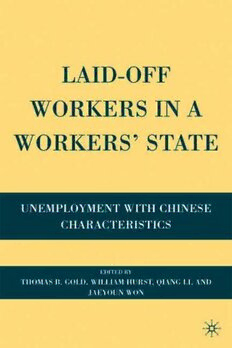
Laid-off workers in a workers' state: unemployment with Chinese characteristics PDF
272 Pages·2009·1.527 MB·English
Most books are stored in the elastic cloud where traffic is expensive. For this reason, we have a limit on daily download.
Preview Laid-off workers in a workers' state: unemployment with Chinese characteristics
Description:
Communist parties lead revolutions in the name of the industrial proletariat. But in the course of China’s post-Mao reforms, perhaps no class has experienced downward mobility as steep as the working class. An estimated 30 million of state enterprise workers have experienced xiagang (laying-off), a stop-gap measure short of full unemployment, leaving them in a sort of limbo without the technical or psychological skills to adjust successfully to China’s new marketized, privatized, and globalized economy. In this book, an international team of scholars explores not only the politics of xiagang, but also the effect on Chinese workers and their families, and the variety of their responses to this unprecedented dislocation in their lives.
See more
The list of books you might like
Most books are stored in the elastic cloud where traffic is expensive. For this reason, we have a limit on daily download.
